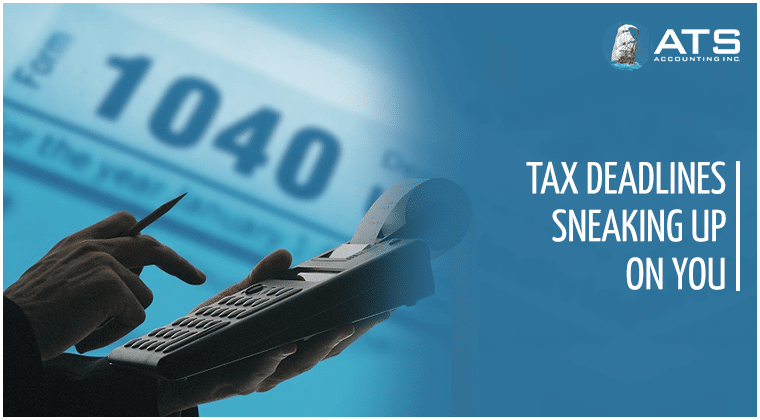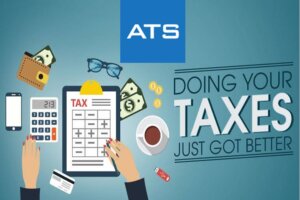If you are new to the province of Alberta or just entering the workforce, you may be overwhelmed by the feeling of filing a personal income tax return (T1 income tax return) and whether it is necessary. That time of the year when Albertans roll up their sleeves, dig out old receipts, and financial documents from the past year and fill out their income tax forms is fast approaching.
For those who end up with a rebate, the process could be rewarding. However, whether you end up owing the government or the government owes you, tax time can be tricky for many. Most income tax and benefit returns are due on or before 30 April, but if it falls on a weekend, the CRA extends the deadline to the following business day. Keep in mind though that you can file your personal tax income return from February 21.
At ATS Accounting & Tax Edmonton, our team of tax advisors can help you with your tax filing and accounting. Let us explore the different facets of accounting and tax returns before filing your taxes in Alberta.
Filing Your Personal Income Tax Return – T1 Tax Return
You must file a personal income tax return if:
- You owe tax.
- You are self-employed and have pension plan premiums due. Also, you are required to file if you are paying employment insurance premiums on your self-employment earnings.
- You and your partner wish to split your pension income.
- You are participating in the Home Buyer’s Plan or Lifelong Learning Plan with repayments due.
- You disposed of the capital property. If you sold your home, you must file a tax return even if you don’t wish to pay capital gains tax on the sale (principal residence exemption).
- Whether you are 9 or 90, age does not influence your requirement to file a personal tax.
- Students are not exempted from filing either. If your 21-year-old child is an entrepreneur who makes over $3,500 (after expenses) running a small business, they must submit a personal tax even if they’re still in school.
While filing your taxes is a yearly tradition, the government makes a few amendments to tweak its tax policy. Here are a few things the Alberta government has altered for 2016:
- Increased Alberta non-refundable tax credits to counterbalance inflation
- Lower-income families with children under 18 years of age qualify to receive the Alberta child benefit as of July 2016.
- Individual income tax rates have changed for taxable income over $125,000, $150,000, $200,000, and $300,000.
- The Alberta overseas employment tax credit has been obliterated.
- The rate used to calculate dividend tax credits for non-eligible dividends has been reformed.
How to File Your T1 Tax Return?
You can fill out your personal income tax form online, on paper, or by phone.
Stages of Filing a Personal Income Tax and Benefit Return
Stage 1: Collect all your information and relevant documents that display your income, and that support any deductions and accounting credits you plan to claim. To fill out your income tax return, you need all your tax information slips that show your income. You should have all your slips and receipts by the end of February. Gather all the receipts or records you will need to support any deductions, credits, amounts, or expenses you will be claiming.
Stage 2: Select the software you wish to use to fill out your details or get the general income tax and benefit package. For example, NETFILE is a certified tax preparation software that offers you a convenient and secure way to do your taxes online.
Stage 3: Make sure all your details are up to date. Changes to your personal information such as your marital status, the number of children you have, your banking information, and your address directly affect your benefits and accounting payments. If there have been any alterations in any of the aforementioned, let the Canada Revenue Agency (CRA) know as soon as possible to ensure you get the entitled paybacks and returns.
Stage 4: Report the income you have received in the year from all sources, both inside and outside Canada. Find instructions on where to report in Alberta an amount on the back of your information records.
Stage 5: Calculate the deductions, tax credits, and benefits you can claim. This information is required so that you can claim on your return to reduce the amount of tax you have to pay. This information can also be found on your tax return or a related tax form in Alberta. If the information is too overwhelming at this step, it is always wise to seek professional help and let our team of experts resolve your queries.
Stage 6: Send your file to the Canada Revenue Agency. With several ways to send your tax file to the CRA, you can file it online using NETFILE-certified software or through an EFILE service provider, such as a tax preparer. ATS Accounting & Tax Edmonton helps in preparing and e-filing your individual, corporate, and estate tax returns at the local, provincial, and federal levels.
Stage 7: If you filed your taxes late, your records must be secured for six years from the date the tax was filed. If there are any claimed expenses, deductions, or accounting credits, make sure you store all your receipts and related documents in case the CRA asks to see them.
Personal Income Tax Returns – T1 Tax Returns
How can I avail maximum tax returns? When do I get the refund?
You can avail maximum reimbursements in the following ways:
- Keep your transit passes
- Use your tuition credits
- Claim your student loan interest
- Claim medical expenses
- Use the dividend tax credit
- Claim utilities such as cell phone and internet expenses
- Claim your work expenses such as conveyance, uniform, costs incurred on purchasing work-related items
If you file your return online and choose direct deposit, you get your refund in as little as eight business days. If you send a paper return, it generally takes eight weeks to issue your notice of assessment and any refund.
Do You Need Help with Your Personal Income Tax Return?
Filing a T1 tax return can be quite daunting with so many steps and procedures involved. What’s more, managing all your tax deadlines, including payroll, corporate, sales tax, and more, can be a big job that diverts you from other things you have to do to run your business.
At ATS Accounting & Tax Edmonton, we take pride in staying on top of these deadlines for our clients, so they don’t have to stress about them. We prepare and file both your personal and business tax returns. We ensure that you will take advantage of every deduction possible, discuss your options with you, and perform your tax compliance work accurately and on time.
Ready to get started? For more information about our accounting and tax services, book your free 15-minute consultation by calling us at 780-484-4006 or contacting us online.




